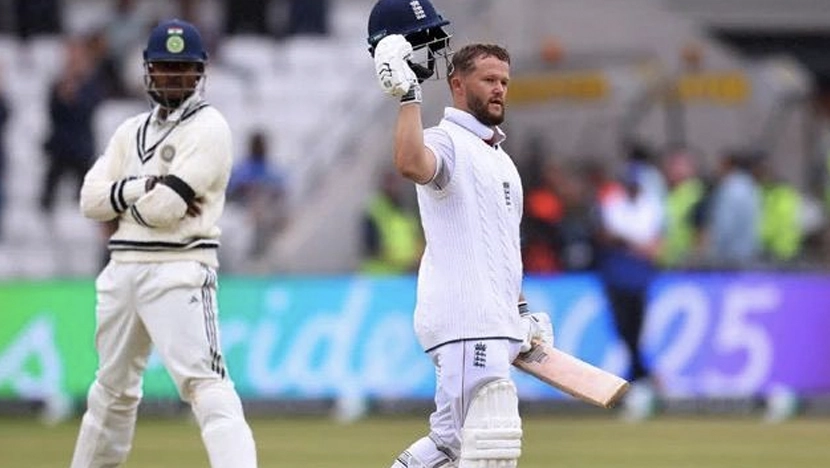In a riveting showdown at Headingley, Leeds, England orchestrated one of their most memorable Test victories, hunting down a mammoth 371-run target to defeat India by five wickets and take a 1–0 lead in the Anderson–Tendulkar Trophy. The record-laced win came in just 82 overs, making it the second-highest successful fourth-innings chase in English Test history, and arguably one of the most daring.
The architect of England’s audacious charge was Ben Duckett, whose blazing 149 on the final day dismantled India’s plans and crowned him the undisputed Player of the Match. Following his composed 62 in the first innings, Duckett returned with fireworks, blending fearless aggression with controlled strokes, reverse-sweeping Ravindra Jadeja and daring Jasprit Bumrah with ramp shots and drives. It was “Bazball” in its finest form.
Partnering with Duckett in the early part of the innings was Zak Crawley, who laid the foundation with a gritty 65. Joe Root’s steady 53 not out and debutant Jamie Smith’s calm 44* ensured that the finishing touch came with finesse. Smith fittingly sealed the chase with a six over deep mid-wicket, igniting wild celebrations in the stands and among England’s players.
Ben Stokes’ decision to bowl first after winning the toss was met with raised eyebrows. But even amid India’s imposing totals of 471 and 364, the England captain stood by his judgment, and his team backed it with one of their boldest statements in recent years.
India’s Batting Feat Overshadowed
For India, this match will be remembered less for their batting brilliance and more for a historic collapse. Under new captain Shubman Gill, India stacked up five individual centuries across two innings—an achievement rarely seen in the long history of Test cricket.
Gill himself led from the front with a stylish 147, while Yashasvi Jaiswal opened with a punchy 101. Rishabh Pant, continuing his resurgence in red-ball cricket, hammered centuries in both innings—134 in the first and 118 in the second. KL Rahul added muscle to the batting lineup with a fluent 137 in the second innings.
But despite these towering performances, India unravelled when it mattered most. In the first innings, they lost their last seven wickets for just 41 runs. In the second, a late-order collapse saw them go from 333/5 to 364 all out—a slump of five wickets for 31 runs.
That lack of tail-end resistance, and some costly fielding mistakes, proved fatal. Day five was particularly painful for India in the field, with dropped catches and misfields punctuating the defense of their target. A misjudged effort by Jaiswal, who spilled a straightforward chance, drew flak online and may have decisively tilted the momentum.
Bumrah’s Milestone and Tongue’s Triumph
Jasprit Bumrah reached a significant milestone, becoming the first Asian pacer to take 150 Test wickets in SENA (South Africa, England, New Zealand, and Australia) countries. He also claimed a five-wicket haul (5/83) in the first innings but went wicketless when it mattered most during England’s final-day onslaught.
Josh Tongue, returning from injury, made an immediate impact. His spell of 4/94 in the first innings and 3/63 in the second provided England with breakthroughs just when India looked set to bat them out of the contest. Contributions from Chris Woakes, Shoaib Bashir, and Brydon Carse helped balance the attack, while Ben Stokes once again proved an instinctive leader on the field.
India’s bowlers, including Prasidh Krishna and Shardul Thakur, managed a few late wickets on day five, but the damage had already been done. The bowlers simply had no answers to Duckett’s innovation and England’s sheer tempo.
“Bazball” Strikes Again
This win will go down as another feather in the cap for England’s “Bazball” approach. Attacking from ball one, unafraid to take risks, and thriving under scoreboard pressure—this was a manifesto of intent. Former skipper Michael Vaughan summed it up best, remarking England would have chased even 450, given the way they approached the game.
Post-match, Vaughan and India’s Wasim Jaffer indulged in some social media jousting, with Vaughan cheekily suggesting this could well become a 4–0 drubbing in favour of England, hinting at the pressure already mounting on Gill’s young shoulders.
What Lies Ahead
The win marks a thunderous start to England’s 2025–27 ICC World Test Championship campaign and further solidifies Headingley’s reputation as a venue where miracles do happen.
India, meanwhile, returned to the drawing board. Despite statistical dominance with the bat, they failed to close out a game that was firmly in their control at multiple stages. For Shubman Gill, the Edgbaston Test—set to begin July 2—presents the first real test of his captaincy character.
England are expected to be bolstered by the return of Jofra Archer for the second Test, while India may be tempted to rejig their bowling unit. A response is essential, or this tour could spiral into a nightmare before it even hits the halfway mark.
In a series that promised drama, the opening act has already delivered a classic.
